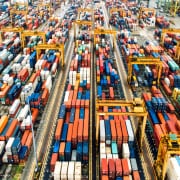|
Getting your Trinity Audio player ready...
|
South Africa’s record of enforcement and prosecution against foreign bribery remains woefully low, at a time when global enforcement has dropped to its lowest level since Transparency International (TI) began measuring enforcement patterns of some of the world’s biggest exporters in 2009. When huge multinational companies bribe foreign public officials with the ultimate aim of bigger profits, the cost is the diversion of resources, the undermining of democracy, the breakdown of the rule of law, and the distortion of markets.
The 14th edition of the TI report, Exporting Corruption 2022: Assessing Enforcement of the OECD Anti-Bribery Convention, released today, reviews 47 leading export countries in the period 2018-2021, 43 of which are signatories to the Convention along with China, India, Hong Kong SAR, and Singapore. It confirms the alarming downward trend in enforcement which had already begun in 2018.
Each country is classified in one of four enforcement categories: active, moderate, limited, and little or no enforcement. Only two – Switzerland and the US, which make up 11.8% of global exports – are considered “active enforcers” that investigate, charge and impose sanctions in line with their share of exports. Furthermore, the only two countries showing improvements are Latvia and Peru, while nine countries declined over the period.
Most of the countries surveyed have limited or no enforcement at all, including China, the world’s top exporter. This combined group of 38 countries accounts for 55% of all global exports – yet foreign bribery abuses go unpunished.
South Africa’s poor show
South Africa, representing 0.4% of global exports, falls in this group. During the period 2018 – 2021, it opened seven investigations, commenced one case, and concluded no cases with sanctions. As a reason, authorities cite “non-cooperation” of some foreign authorities regarding mutual legal assistance requests, especially in the African context.
“South Africa’s failure to ramp up its efforts in enforcing and prosecuting companies involved in bribery of officials is a matter with serious and long-lasting consequences,” says Karam Singh, executive director of Corruption Watch. “One need look no further than the fall-out of state capture in South Africa, and the havoc that was wreaked on our public institutions and state-owned enterprises by the acts of large multi-national companies implicated in the channelling of public money into private profits.”
The buying of influence over government decision-making is another consequence, adds Singh, and must be seen as a criminal act for which harsh sanctions must be imposed.
“In this context, companies like Bain, McKinsey and Bell Pottinger come to mind. The recent sanctioning of Bain by the South African government, outside the reporting period of this report, is a great development for consequence management for corporations involved in facilitating state capture.”
The perceived weaknesses in South Africa’s legal framework and enforcement system are cause for concern. In terms of the legal framework, some of the key gaps are the lack of criminal liability for corporations, inadequate accounting and auditing requirements, the failure to hold companies responsible for subsidiaries, joint ventures and agents, and inadequate sanctions.
Regarding the enforcement system, issues of concern include the inadequate resources made available for key institutions, political interference and a lack of independence, decentralised organisation of enforcement, and the lack of co-ordination between investigations and prosecutions. There is also an absence of training of investigators to pursue this type of offence, as well as the inadequacy of complaints mechanisms, and whistle-blower protection.
On a more positive note, the recent revision of the global standard on beneficial ownership transparency is a step in the right direction, and opens more opportunities for effective detection and investigation of abuses by shady actors. Similarly, the brave work of investigative journalists, whistle-blowers and NGOs in uncovering cross-border cases has made up for the inaction of many major exporters.
Foreign bribery enforcement under pressure
On the eve of the 25th anniversary of the OECD Anti-Bribery Convention, which compels parties to prohibit and enforce against foreign bribery, and just as the working group is set to meet from today, Tuesday 11 October, foreign bribery enforcement faces major setbacks.
The report compels all countries assessed to do much more to enforce against foreign bribery, outlining some key measures to improve enforcement. Recommendations specific to South Africa include (but are not limited to):
- Publish statistics on foreign bribery, even if the numbers are zero;
- Develop the capacity of the NPA to deliver on its mandate and pursue prosecution of foreign corruption cases;
- Review and reform whistle-blower protection by amending the Protected Disclosures Act;
- Amend Section 34A of the Prevention and Combating of Corruption Activities Act to strengthen the duties of private sector entities and enhance measures to prevent bribery;
- Provide training and resources to investigators and prosecutors to build capacity for investigating complex matters;
- Allocate appropriate financial resources to five key anti-corruption institutions; and
- Provide for deferred prosecution agreements and authorise offers of immunity from criminal/civil prosecution if an honest disclosure is made.
For a full list of recommendations, read the report: https://www.transparency.org/en/exporting-corruption.
For media queries, please contact:
Oteng Makgotlwe
Cell: 076 473 8336 E-mail: OtengM@corruptionwatch.org.za
About Transparency International
Transparency International is a global movement with one vision: a world in which government, business, civil society and the daily lives of people are free of corruption. For more information, go to the website.
About Exporting Corruption
The Exporting Corruption series by Transparency International is an independent review of the foreign bribery enforcement performance of 47 leading global exporters, which places countries into four categories of foreign bribery enforcement according to the number of investigations and cases the authorities open and conclude with sanctions over a four-year period. Different weights are assigned according to the stages of enforcement and the significance of cases. Countries’ share of world exports also factors into their placement.








